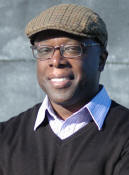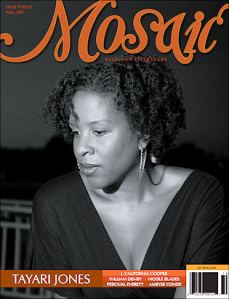 MEET RON KAVANAUGH: Ron Kavanaugh is the executive director at Literary Freedom Project. A true literary leader, Ron is also the publisher of Mosaic Literary Magazine and the founder of MosaicBooks.com. He has previously worked as a consultant with the Bronx Council on the Arts, the Bronx Writers Center and as Director of Marketing and Public Programs at the Bronx Museum of the Arts.
MEET RON KAVANAUGH: Ron Kavanaugh is the executive director at Literary Freedom Project. A true literary leader, Ron is also the publisher of Mosaic Literary Magazine and the founder of MosaicBooks.com. He has previously worked as a consultant with the Bronx Council on the Arts, the Bronx Writers Center and as Director of Marketing and Public Programs at the Bronx Museum of the Arts.
WMI: Mosaic magazine is one of the few periodicals that takes an honest, critical and in-depth look at literature created by members of the African Diaspora. Did you set out to examine literature from a more in-depth yet balanced perspective?
RK: The original idea was to launch a new-book preview guide. The guide would list new books supplied by the publisher. I made a sample, sent it to publishers to see if they would be interested, and received no response. This was in 1995. After that I decided to start a similar idea but this time I focused on the internet, which was just beginning to reach the public. After I started what became MosaicBooks.com, I went back to the original idea, and in 1998 I launched Mosaic Literary Magazine.
WMI: Why do you give voice to writers who are obviously gifted and talented but not household name authors in Mosaic as opposed to solely focusing on established writers?
RK: I think it’s important we take our arts, culture and work and elevate them. The fact that the arts by people of European descent receive more publicity has nothing to do with talent or merit. It’s about advocacy for what you believe in. If you want to place your culture on a higher plain you have to advocate for it by any means necessary.
WMI: Operating a successful magazine takes business savvy. Where did you gain your business training (e.g. college business degree, solely by experience)?
RK: Above all else I have patience and intelligence. I might take exception that Mosaic is “successful.” Of course it is on one level, longevity, but it also continues to be a struggle. The magazine has never covered its expenses, hasn’t been published consistently, and PR has lagged. But my patience –knowing this is not a dash but a marathon– has benefited us most. And every day I learn something new about printing and publishing, which benefits the magazine. We recently launched digital editions of Mosaic and I hope that helps the bottom line.
WMI: Have you ever worked with a mentor in order to grow your business ventures? If so, please tell us about that experience. If not, looking back would you partner with a mentor if you had to do it all over again? Why or why not?
RK: I’ve never had a mentor, but I’ve been fortunate to work for several arts organizations, including the Bronx Council of the Arts and the Bronx Museum. Both organizations have helped me by example. Even though their budgets are much larger than Mosaic‘s they both are relatively small organizations. Bill Aguado, who led the Bronx Council for over 30 years, before he retired in 2010, continues to be a “guiding light” for Mosaic and my mission. He really instills that if you believe in it you have to find a way to get it done.
WMI: When was the Literary Freedom Project founded and what is the purpose of the Project?
RK: LFPwas founded in 2004. It’s a 501c3 tax-exempt nonprofit arts organization that seeks to restore the importance of reading books as an essential tool for creating intelligent, productive, and engaged young people. Towards this goal, LFP publishes Mosaic; develops literature-based lesson plans; and hosts the Mosaic Literary Conference, an annual literature-education event. We invite educators, community organizers, and parents to take part in our programs.
 WMI: Tell us about the Mosaic Literary Conference. When did it launch and who are some of the speakers and panelists planned for upcoming conferences? Also share with our readers the types of workshops offered at the conference.
WMI: Tell us about the Mosaic Literary Conference. When did it launch and who are some of the speakers and panelists planned for upcoming conferences? Also share with our readers the types of workshops offered at the conference.
RK: Originally MLC was called The ReVerse Festival, and was launched in 2003 to connect the community to literature and technology –using blogs and websites as a platform to share and disseminate information. Technology, moving at a breakneck pace, quickly caught up with the idea and my target community adopted many of the ideas and became empowered on its own.
Then in 2006, we rebranded ReVerse to the Mosaic Literary Conference, and morphed into a professional-development-education event that invites teachers and counselors to participate in workshops that will connect their students to books and reading. It’s been fairly successful; smaller and more focused than it had been in the past, which is good for the participants.
WMI: Since you launched Mosaic in 1998 much as changed in the literary and business world, a great deal of the change being driven by technology. For example, e-books have taken off, more newspapers and magazines have gone digital and electronic mobile devices have allowed consumers to digest information at rapid speeds from anywhere in the world. How have these changes reshaped the magazine industry and Mosaic in particular?
RK: The technology really hasn’t affected us much. A book is basically the same regardless of how it’s consumed. It still must be written, edited, and marketed for it to be successful. In a way eReader technology has benefited Mosaic because there are far more writers who have the ability to self publish books –and books still need marketing.
WMI: In addition to the aforementioned changes the literary industry and business worlds have experienced over the last decade, what changes do you see impacting your industry over the next three to five years?
RK: The biggest impact has less to do with technology and more to do with the demise of the Black imprints. In the 90s most of the large publishers started small publishing divisions that produced books specifically for the Black reader. Unfortunately, many of those imprints were discontinued after a few years. It created a void in the literary book genre that hasn’t been filled.
WMI: In order to remain viable, a magazine has to generate income. What strategies, action steps, does Mosaic incorporate to increase subscribers and generate ongoing income?
RK: This has always been a weak point for Mosaic. We mainly engage new subscribers through our website, MosaicMagazine.org. We also use third-party subscription services such as Ebsco and WT Cox to expand or institutional subscriber base. Because we’re a nonprofit we also write grants, which account for about half the money raised.
WMI: Who are some authors we should be aware of, authors who create material that can possibly influence personal and collective thought processes?
RK: I’m not a big fan of “personal power” books but there are two books that I refer to regularly: Invitation to the Party: Building Bridges to the Arts, Culture and Community by Donna Walker-Khune and There’s No Business Like Your Own Business: Six Practical and Holistic Steps to Entrepreneurial Success by Gladys Edmunds. I think the titles explain my fascination.
WMI: What did the closing of Borders mean to you? Do you think it signaled a decline in an appreciation for literature at national and local levels or do you think it was merely an indication of poor business decisions and management?
RK: I think the closing of Borders did not mean much to the reading public. No matter your opinion on the electronic book, it continues to be a force that relegates the traditional bookstore to a secondary option when purchasing new books. I do think bookstores serve a purpose in the community –book signings and hand selling– but the internet has become such an integral part of how consumers shop. Remember the record store?
WMI: If you met the man you were 20 years ago, what advice would you give him to help him be better prepared as a business leader today?
RK: Never stop learning and adopt new technology as quickly as it comes at you.
WMI: Are you accepting work from writers? If so, how can writers contact you to submit material to Mosaic?
RK: Mosaic accepts essays, interviews, and literary-focused articles. Before submitting the full work, send a brief summary to info@mosaicmagazine.org. If you are interested in reviewing books for Mosaic forward a writing sample and bio. We offer an honorarium of $50/700-word review. Honoraria for essays, interviews, and articles vary ($100+) depending on word count. We will consider previously published work. We are not accepting creative writing submissions at this time.
WMI: What last words of encouragement or advice would you like to leave with Write Money Inc. visitors?
RK: What amazes me every day is how technology and social media have leveled the playing field to enter the market. It still takes a lot of work to grow and succeed, but the point of entry is so low and accessible that there’s no reason not to get started today.
Click the “Subscribe” button at the side or bottom of this post so you can always be the very first person to receive our updates!
Check out Spiral, Long Walk Up, Portia and Love Pour Over Me at www.chistell.com




I love your feature interviews. This is another good one! Mosaic sounds like something I need to check out.
Thanks, Tricia! We appreciate your support and your comment.
I appreciate how Ron sees the way the Internet has leveled the playing field. Gone are the days when writers had to beg publishers to accept their manuscripts. Independent book printing, and now e-books, have truly leveled the playing field in the book industry. Social networking makes it that much easier for authors to spread the word and create “buzz” around their work. Good interview!
True. The Internet has leveled the playing field, but you better know how to generate “buzz” if you plan on selling lots of books online (or offline, for that matter). It takes time and often money to create “buzz” around a book. But, hey — if you’re passionate about your work, you’ll do what it takes to get your books off the ground. I do like that this magazine features lesser known authors and not just big name writers.
I agree with Jeff. You have to create the “buzz” first and that’s not always as simple as it seems.
Thanks for your comments, Donald, Jeff and Mark! Appreciate them. Also agree about creating buzz. It does take vision and concentrated effort. Keep visiting Write Money Inc. to stay abreast of what’s going on in the creative business world!
I hated to see Borders close. I agree that more and more people are reading books electronically. However, I prefer print books and like it when I see brick and mortar stores thriving, especially local bookstores that have been in the community for years.
Marla, I didn’t want to see Borders close either, but I think management decisions got the best of them. I’m glad to see ebooks taking off, but I also like print books.
It is truly a breath of fresh air to see this dude supporting literature the way he does!! I hope more follow in his footsteps. It’s good for kids and adults, because reading never goes out of style.
Anthony, couldn’t agree with you more! Ron is a breath of fresh air! Appreciate all he does; thanks for your comment!
Quote of the Day:
“It’s about advocacy for what you believe in. If you want to place your culture on a higher plain you have to advocate for it by any means necessary.”
The above, really, is bottom line. Folks like Denise, and Ron understand this completely. But we need more people like them to really make a difference — especially more prominent folks whose influence carries more weight than most individuals.
True the barriers to entry for creating a book have been removed, but the increased competition for getting the word about about your book, distribution, SEO, and many other factors make the task of selling your book so difficult the original barriers to entry may as well still be in place.
Borders’ closing also hurt because Borders were actually big purchasers of books written by Black authors. The stores in places like Bowie, MD had staff that were not only knowledgeable about what was being published, but had relationships with authors and publishers — they were a big loss…
You do have to advocate for what you believe in. But it is belief in something that helps you to do that. On another note, I agree with Troy that bookstores that have relationships with authors, publishers and regular book buyers are a real win for everyone who loves and appreciates good literature. BTW, aalbc.com is another favorite literary site of mine.
Digital magazines are gaining traction. QBR just went digital. Look to see these magazines start accepting digital subscriptions. One thing, you won’t have to worry about an issue getting lost in the mail.
Thanks for all the feedback and positivity. Continue the good work.
This is a new day that has entered for authors and even self-publishers to build their vision of writing and marketing, the outlet and tools are there in technology to get their vision and message out to their public. Authors also must realize that they must challenge themselves if they look to succeed in this business, it takes vision, passion and knowledge, one must keep up with technology or get left behind. The use of social networking as even become wider in terms of groups and global connections. I admire your site and look forward to acting upon your offers. Keep writing!
Pingback: Building Successful Communities and Using Ad Programs to Earn a Full-Time Living | Write Money Incorporated
Pingback: Creativity Stirs Up Your Vision, Leading You to New Business Insights | Write Money Incorporated
Pingback: The Savane Group is Purposely Coaching Entrepreneurs toward Record Setting Success | Write Money Incorporated